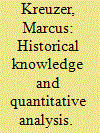| Srl | Item |
| 1 |
ID:
097023


|
|
|
|
|
| Publication |
2010.
|
| Summary/Abstract |
Political scientists commonly draw on history but often do not read actual historians carefully. This limited engagement with historians, and with contextual information more generally, contributes to a loss of historical knowledge that can undermine the validity of quantitative analysis. This article makes this argument by means of an examination of the qualitative evidence underlying the important quantitative arguments about the origins of electoral systems advanced by Carles Boix and by Thomas Cusack, Torben Iversen, and David Soskice. The article explores how their respective attention to historical knowledge affects the quality of their data, the plausibility of their hypotheses, and, ultimately, the robustness of their statistical findings. It also analyzes how such knowledge sheds new light on the causal direction between institutions and their economic effects.
|
|
|
|
|
|
|
|
|
|
|
|
|
|
|
|
| 2 |
ID:
165853


|
|
|
|
|
| Summary/Abstract |
Explanation presumes description. Description explores the who, when, where, and how, and its answers furnish the raw material for theorizing and explaining. This connection between description and allegedly serendipitous exploration contributed to the notion that description is inherently subjective and thus incapable of being evaluated. I challenge this notion of “mere” description. I show that description has a distinct structure that consists of discreet analytical stages facing distinct inferential challenges. The quality of description thus becomes a function of how well it addresses those challenges. I explicate distinct criteria for evaluating how well a describer handles those challenges. I illustrate their utility by applying them to the controversy in the late 1990s between Daniel Goldhagen and Christopher Browning over what explained the willingness of ordinary Germans to kill Jews.
|
|
|
|
|
|
|
|
|
|
|
|
|
|
|
|